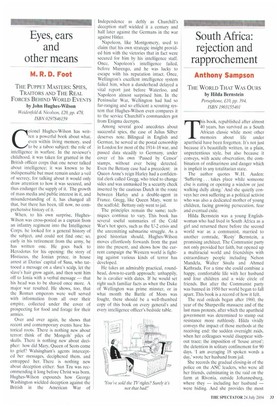Eyes, ears and other means
M. R. D. Foot
THE PUPPET MASTERS: SPIES, TRAITORS AND THE REAL FORCES BEHIND WORLD EVENTS by John Hughes-Wilson Weidenfeld & Nicolson, 120, pp. 478, ISBN 0297846159 Colonel Hughes-Wilson has written a powerful book about what, even within living memory, used to be a taboo subject: the role of intelligence in warfare. In the reviewer's childhood, it was taken for granted in the British officer corps that one never talked about intelligence; it was known to be indispensable but must remain under a veil of secrecy, for talking about it would only draw attention to how it was secured, and thus endanger the supply of it. The growth of mass media and public interest in it, and misunderstanding of it, has changed all that, but there has been, till now, no comprehensive history of it.
When, to his own surprise, HughesWilson was cross-posted as a captain from an infantry regiment into the Intelligence Corps, he looked for a general history of the subject, and could not find one; so, early in his retirement from the army, he has written one. He goes back to Herodotus for his opening: the story of Histiaeus, the Ionian prince, in house arrest at Darius' capital of Susa, who tattooed a message on a slave's scalp, let the slave's hair grow again, and then sent him off to Ionia with a verbal message — that his head was to be shaved once more. A major war resulted. He shows, too, that the Roman emperors were well served with information from all over their empire. collected under the cover of prospecting for food and forage for their armies.
Over and over again, he shows that recent and contemporary events have historical roots. There is nothing new about terror: think of the Mongols' piles of skulls. There is nothing new about decipher: how did Mary, Queen of Scots come to grief? Walsingham's agents intercepted her messages, deciphered them, and entrapped her. There is nothing new about deception either: Sun Tzu was recommending it long before Christ was born. Hughes-Wilson expounds how George Washington wielded deception against the British in the American War of Independence as deftly as Churchill's deception staff wielded it a century and half later against the Germans in the war against Hitler.
Napoleon, like Montgomery, used to claim that his own strategic insight provided him with the victories that in fact were secured for him by his intelligence staff. Once, Napoleon's intelligence failed, before Marengo, and he was lucky to escape with his reputation intact. Once, Wellington's excellent intelligence system failed him, when a dunderhead delayed a vital report just before Waterloo. and Napoleon almost surprised him. In the Peninsular War, Wellington had had so far-ranging and so efficient a scouting system that Hughes-Wilson even compares it to the service Churchill's commanders got from Enigma decrypts.
Among several good anecdotes about successful spies, the case of Julius Silber deserves note. Bilingual in English and German, he served at the postal censorship in London for most of the 1914-18 war, and passed data steadily to Germany, under cover of his own Passed by Censor' stamps, without ever being detected. Even the Bettany case had a precedent: in Queen Anne's reign Harley had a confidential clerk called Gregg, who tried to change sides and was unmasked by a security check inserted by the cautious Dutch in the route between Harley and a double-agent in France. Gregg, like Queen Mary, went to the scaffold; Bettany only went to jail.
The principles remain the same; techniques continue to vary. This book has several useful summaries of the Cold War's hot spots, such as the U-2 crisis and the unremitting submarine struggle. As a good historian should, Hughes-Wilson moves effortlessly forwards from the past into the present, and shows how the current campaign the Western world is fighting against various kinds of terror has developed.
He takes an admirably practical, roundhead, down-to-earth approach; unhappily, he is cavalier with dates. If he would set right such familiar facts as when the Duke of Wellington was prime minster, or in what month the Battle of Mons was fought, there should be a well-thumbed copy of this book on every general's and every intelligence officer's bedside table.


























































 Previous page
Previous page